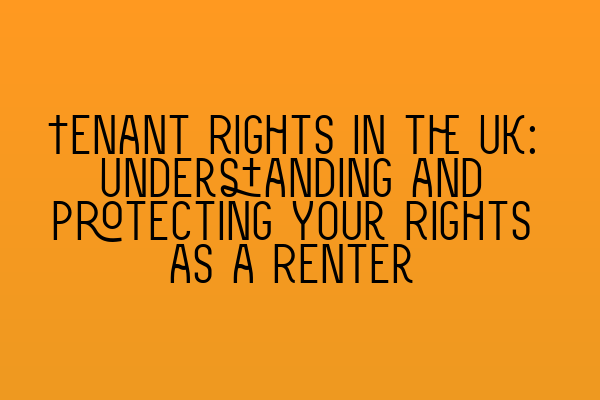Tenant Rights in the UK: Understanding and Protecting Your Rights as a Renter
As a tenant in the UK, it is crucial for you to know and understand your rights to ensure a smooth and fair renting experience. Understanding your rights not only empowers you to protect yourself from potential abuses, but it also helps in maintaining a good relationship with your landlord. In this blog post, we will dive into the key tenant rights in the UK and provide you with the necessary guidance to protect and assert these rights effectively.
1. Right to a Written Agreement
It is essential to have a written tenancy agreement in place. This agreement acts as a legally binding contract between you and your landlord, stating the terms and conditions of your tenancy. It should include crucial details such as the duration of the tenancy, rent amount, any deposit required, and the responsibilities of both parties.
2. Right to a Safe and Habitable Property
As a tenant, you have the right to live in a safe and habitable property. Your landlord is responsible for ensuring that the property meets all relevant health and safety regulations. This includes the provision of proper heating, clean water supply, sanitation facilities, and electrical safety, among others. Should there be any issues with the property that impact its habitability, it is your right to prompt your landlord to rectify them.
3. Right to Privacy
Your landlord should respect your right to privacy. While they may need to access the property for maintenance or inspections, they must provide reasonable notice beforehand. In general, they should give you at least 24 hours’ notice, except in cases of emergencies.
4. Right to Protection from Unfair Eviction
Under the UK law, landlords cannot evict you without following the proper legal procedures. There are several types of tenancy agreements, each with its own rules on eviction. It is crucial to know which type of tenancy you have to understand the eviction process applicable to you. In most cases, landlords need to provide a valid reason for eviction and obtain a possession order from the court.
5. Right to Receive Your Deposit Back
If you have paid a deposit, your landlord is legally required to protect it in a government-approved tenancy deposit scheme. At the end of your tenancy, you have the right to get your deposit back in full, unless there are valid deductions for damages or unpaid rent. Your landlord must provide you with an inventory report and evidence of any deductions made from the deposit.
6. Right to Challenge Unfair Rent Increases
If you are on an assured shorthold tenancy, your landlord must provide you with a valid notice period and justification for any rent increase. Rent increases should not be arbitrary or unreasonable. If you believe that the proposed rent increase is unfair, you have the right to negotiate or challenge it.
7. Right to Redress
If you have any complaints against your landlord or letting agent, you have the right to seek redress. You can contact the relevant redress scheme, such as the Property Ombudsman or the Housing Ombudsman, for assistance in resolving disputes.
8. Right to Join a Tenants’ Association
You have the right to join or form a tenants’ association to collectively discuss and address any issues or challenges faced by tenants in your building or area. This can provide a stronger voice and a platform for advocating for your rights and interests.
Understanding your rights is the first step in protecting yourself as a tenant. However, it is equally important to ensure that you comply with your responsibilities as outlined in your tenancy agreement. This includes paying your rent on time, reporting any maintenance issues promptly, and taking care of the property.
For further assistance and guidance regarding tenant rights and related legal matters, you can reach out to SQE Property Law & Land Law, a leading solicitor firm specializing in property law. They offer expert advice and services to help you navigate through any complex legal situations you may encounter as a tenant.
Related Articles:
– SQE 1 Practice Exam Questions
– SQE 1 Practice Mocks FLK1 FLK2
– SQE 2 Preparation Courses
– SQE 1 Preparation Courses
– SRA SQE Exam Dates
Remember, knowledge is power, and being well-informed about your rights as a tenant puts you in a better position to protect yourself and enjoy a positive renting experience.
